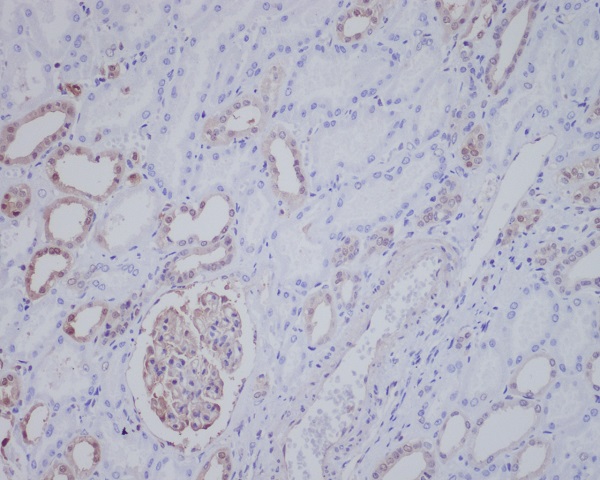
| WB | 咨询技术 | Human,Mouse,Rat |
| IF | 咨询技术 | Human,Mouse,Rat |
| IHC | IHC:1/100-1/200;IHF:1/50-1/200 | Human,Mouse,Rat |
| ICC | 1/50-1/200 | Human,Mouse,Rat |
| FCM | 咨询技术 | Human,Mouse,Rat |
| Elisa | 咨询技术 | Human,Mouse,Rat |
| Aliases | ALK tyrosine kinase receptor; Nucleophosmin; NPM1; ALK; NPM-ALK;ALK |
| WB Predicted band size | 176 kDa |
| Host/Isotype | Rabbit IgG |
| Antibody Type | Primary antibody |
| Storage | Store at 4°C short term. Aliquot and store at -20°C long term. Avoid freeze/thaw cycles. |
| Species Reactivity | Human,Mouse,Rat |
| Immunogen | A synthesized peptide derived from human ALK |
| Formulation | Purified antibody in PBS with 0.05% sodium azide,0.05% BSA and 50% glycerol. |
+ +
以下是关于ALK抗体的3篇参考文献概览:
---
1. **文献名称**:**"Identification of the transforming EML4-ALK fusion gene in non-small-cell lung cancer"**
**作者**:Soda M, Choi YL, Enomoto M, et al.
**摘要**:该研究首次报道了EML4-ALK融合基因在非小细胞肺癌(NSCLC)中的致癌作用。通过基因测序和抗体免疫组化(IHC)验证,证实ALK蛋白在融合基因阳性的肿瘤中异常表达,为后续ALK靶向治疗及诊断抗体开发奠定了基础。
---
2. **文献名称**:**"ALK immunohistochemistry in lung cancer: Comparison of antibody clones and staining protocols"**
**作者**:Choi YL, Lira ME, Hong M, et al.
**摘要**:研究比较了不同ALK抗体克隆(如D5F3和5A4)在肺癌组织中的免疫组化检测效果,探讨了染色条件对结果的影响。结果显示D5F3抗体具有更高的敏感性和特异性,支持其作为ALK阳性肺癌的临床诊断工具。
---
3. **文献名称**:**"The role of ALK FISH and IHC in selecting patients for ALK-targeted therapies"**
**作者**:Takeuchi K, Soda M, Togashi Y, et al.
**摘要**:研究评估了荧光原位杂交(FISH)和免疫组化(IHC,使用ALK抗体)在筛选ALK阳性肺癌患者中的一致性。结果显示IHC与FISH高度吻合,支持ALK抗体作为快速、经济的初筛方法,指导靶向药物(如克唑替尼)的使用。
---
这些文献涵盖了ALK抗体的基础研究、诊断技术优化及临床应用,为理解其在肿瘤学中的价值提供了关键依据。
ALK (anaplastic lymphoma kinase) is a receptor tyrosine kinase initially identified in 1994 through its involvement in chromosomal translocations associated with anaplastic large cell lymphoma (ALCL). The ALK gene encodes a transmembrane protein that plays roles in nervous system development and cell proliferation. Dysregulation of ALK, often due to gene fusions (e.g., NPM-ALK, EML4-ALK), leads to constitutive kinase activation, driving oncogenic signaling in cancers such as ALCL, non-small cell lung cancer (NSCLC), and inflammatory myofibroblastic tumors.
ALK antibodies are critical tools in diagnostics and research. In clinical pathology, anti-ALK antibodies (e.g., clone D5F3. ALK1) are used in immunohistochemistry (IHC) to detect ALK protein overexpression or fusion-derived activation, aiding in the diagnosis of ALK-driven malignancies. For example, ALK rearrangement in NSCLC is a key biomarker for guiding targeted therapy with ALK inhibitors like crizotinib or alectinib.
Therapeutic ALK-targeted antibodies, though less common than kinase inhibitors, are under exploration. Research antibodies also facilitate studies on ALK signaling pathways, tumorigenesis mechanisms, and drug resistance. Challenges include optimizing antibody specificity due to structural similarities among kinase domains and addressing heterogeneity in ALK fusion variants.
Overall, ALK antibodies remain pivotal in both characterizing ALK-related malignancies and advancing precision oncology strategies.
×